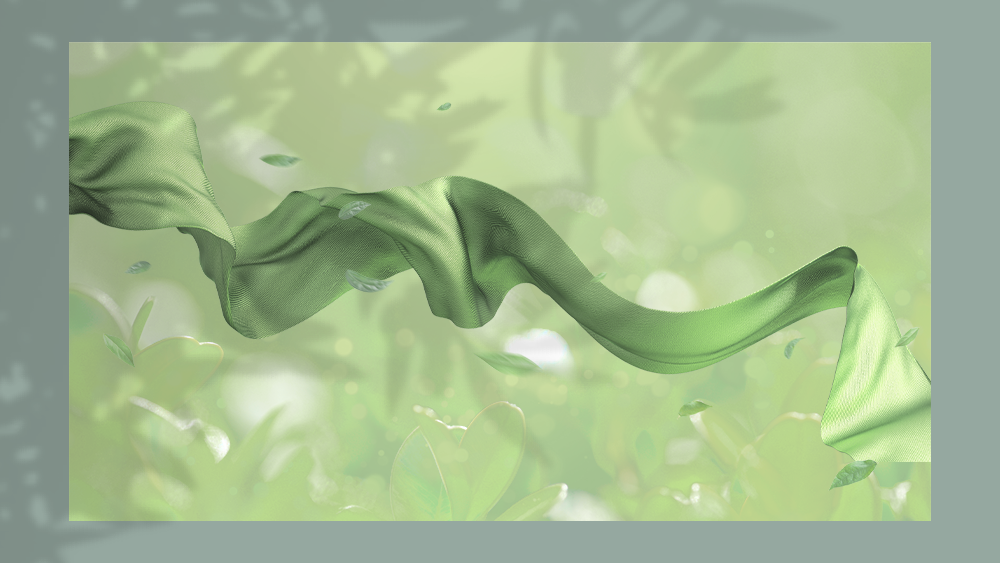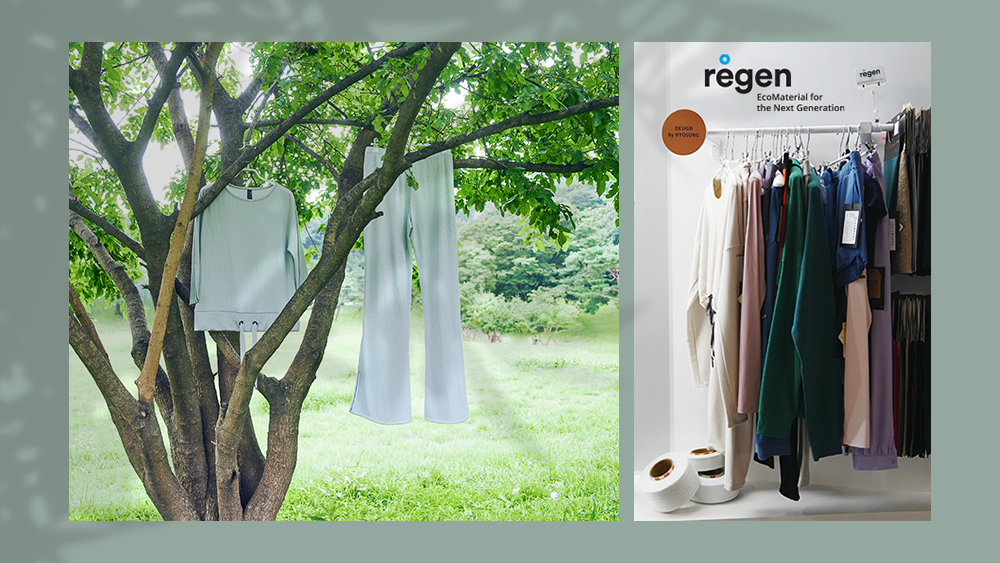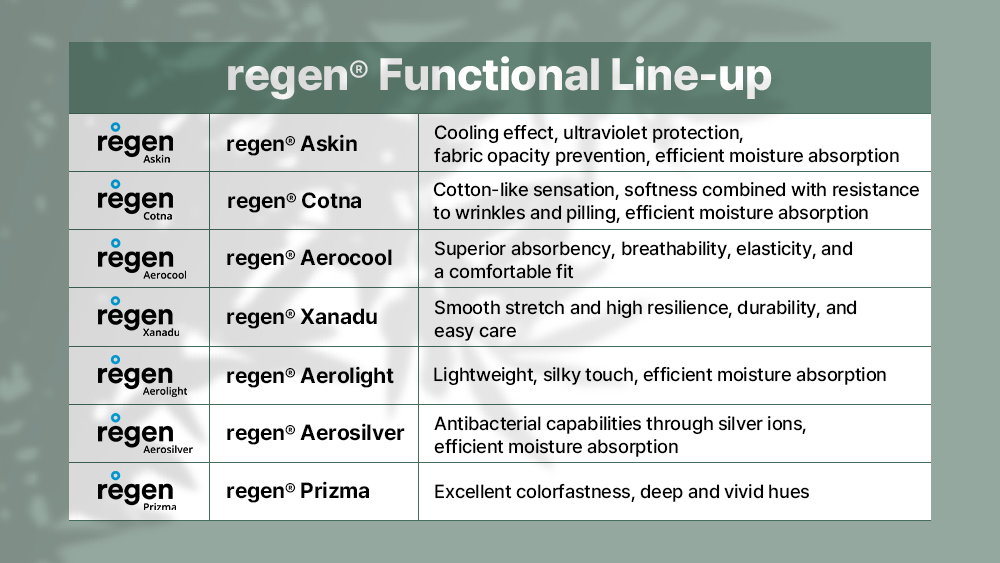Eco-Friendly regen Functional Lineup, With Seven Astonishing Features
2023.05.05
Influencers are setting the trend on social media with their respective personality and charm. What they do and wear gain attention and followers. Their influence is not confined to domestic audience but reaching out to global users via social medial, especially centering around the MZ generation. With all eyes on themselves, these influencers try out new clothing on a daily basis to differentiate, gain new followers and continue to create buzz. Their followers who admire and relate to them often follow suit the influencers’ pattern of consumption, further facilitating the cycle of fast fashion.
The biggest issue of the fast fashion industry is its environmental impact. According to UNECE (UN Economic Commission for Europe), fashion industry as a whole account for 20 percent of water consumption and 10 percent of carbon dioxide emissions across different industries in the world. Its manufacturing process requires lots of resource input and emits greenhouse gas, a main culprit of climate change. Its distribution process also has a large carbon footprint across the world as clothes manufactured in countries with cheap labor travel around the world before they are purchased by end-users. Clothes never sold are either incinerated or end up in landfill.
As such, fashion industry is now faced with a new challenge of fulfilling the need of the day, preservation of environment, while continues to put forth beautiful and unique clothes. With many celebrities voicing their concerns about the environment, the general public are increasingly awakened to the importance of the environmental issue. Global Web Index, a UK-based marketing company, released a report that 61 percent of the millennials are aware of the issue and willing to purchase ‘green products’ even if they are pricier than others. In other words, we now have a growing demographic of ‘eco consumers’ who make their consumption choices in consideration of environmental issues. The corporate world is also responding and it is not only fashion industry but also other industries that have been responsive.

Hyosung is no exception. It has been working tirelessly to lead a sustainable fashion industry and develop eco-friendly materials. Hyosung TNC, for instance, has developed recycled textiles for polyester, nylon, and spandex for the first time in Korea. In so doing, Hyosung TNC has contributed to cutting down on plastic consumption in the clothing manufacturing process and promoting plastic recycling. Here are some of the company’s innovative products, a by-product of its continuous research and development endeavor.
First recycled polyester yarn in Korea, regen
Hyosung regen is the first product in Korea that applied a technology that recycles discarded PET bottles. Regen polyester contributes to reducing landfill volume and CO2 emissions. Based on its 15-year know-how and technology, Hyosung has created a recycled yarn that maintains the function and quality of virgin polyester. It has been working on materialistic and chemical recycling through its R&D efforts. As such, Hyosung TNC continues to offer green products, protect environments, and create a responsible consumption culture among consumers and corporates.

World’s best recycled nylon yarn, regen Ocean Nylon
Hyosung TNC has worked together with local fishing communities to separately discard waste fishing nets so that they can be easily recycled. Collaborating with venture companies working on sustainability, Hyosung TNC collects, shreds, and cleans waste fishing nets for pre-production process. After this, the fishing net waste are melted to separate raw materials to be recycled to regen Ocean Nylon, creating a virtuous cycle.
regen® Jeju, a recycled yarn from used PET bottles in Jeju
Hyosung TNC is committed to turning discarded PET bottles from Jeju into recycled yarns. To that end, the company has formed an MOU with the Jeju Special Self-governing province, Ministry of Environment and Jeju Province Development Corporation for a project of recycling PET bottle waste in Jeju into plastic bags. This should be a good example of positive influence by a private-public cooperation.
Under this project, the Ministry of Environment and Jeju local government established the so-called ‘Clean House’ system of household waste collection facilities while Jeju Development Corporation collects discarded PET bottles. These PET bottle wastes are fed into Hyosung TNC’s manufacturing system to produce regen® Jeju, the 100% recycled yarn, which is then used for production of fashion items under the brand of Pleatsmama. A knit pleats bag produced by Pleastsmama out of this virtuous cycle uses 16 PET bottles of 500ml.
regen Spandex made of recycled waste
regen Spandex is 100% recycled spandex made of reclaimed waste, which is not only eco-friendly but also boasts excellent functions. Its global market share is over 30%, securing global number one name.
Hyosung TNC has also been on a journey to develop various types of eco-friendly recycled yarns.

After all, fashion is about reflecting who you are in a stylish manner. But fast fashion industry is blamed for its role in environmental degradation to speed up climate crisis. Realistically, it is almost impossible to put a stop to clothing manufacturing and purchase. This is where innovation in technology come in handy. With the innovative technology of recycling discarded PET bottles into a yarn while cutting down on carbon footprint of the whole fashion manufacturing process, we can move a step closer to addressing environmental issues caused by the fashion industry as a whole. Hyosung TNC is committed to taking the leadership in creating such a virtuous manufacturing cycle with its innovative technology, and to continuing its pursuit of a sound manufacturing industry going forward.